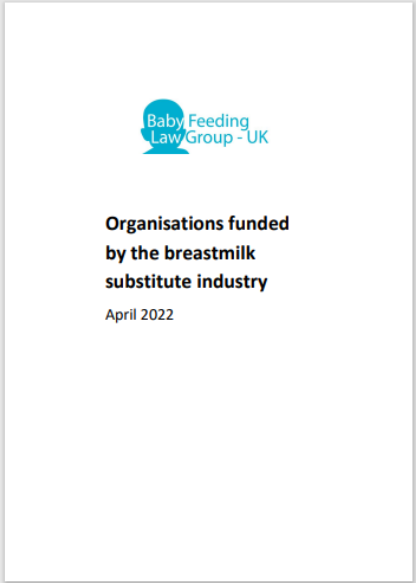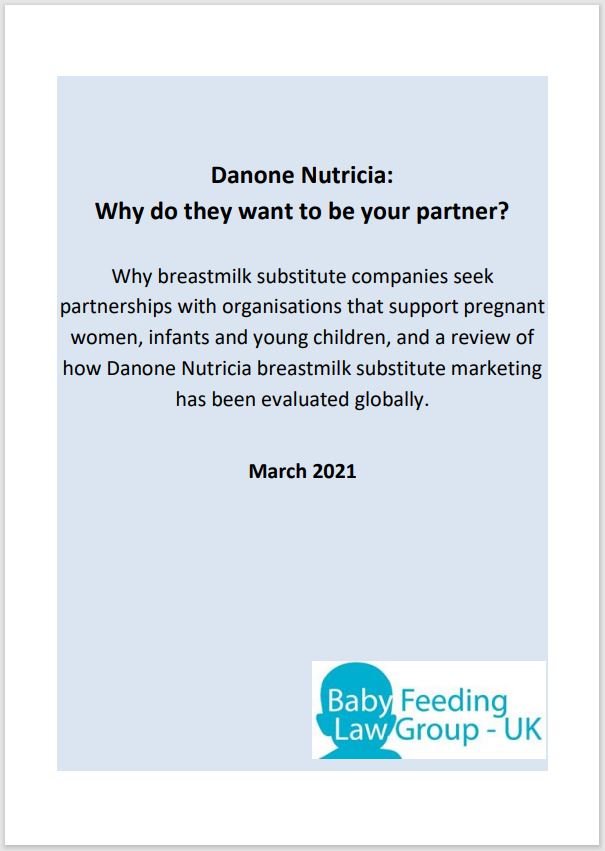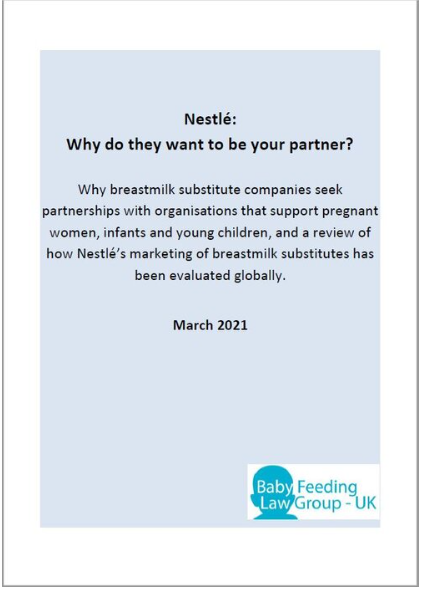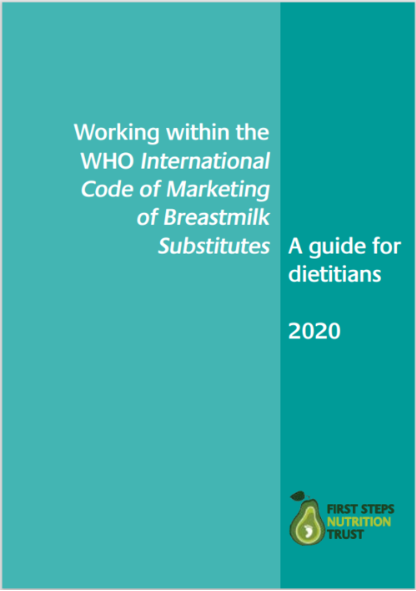October 2022
This month our newsletter is brought to you by Susan, our Senior Nutritionist.
Welcome to our October newsletter, I hope you are enjoying this colourful, fruitful season and have the opportunity to get outdoors and kick a few leaves or just enjoy the autumn colours. For those of you who don’t already know me, I have worked with FSNT from the very beginning, 11 years ago. Since then, I have had a hand in many of our resources including co-writing our first ever report ‘Infant Milks in the UK – A practical guide for health professionals’ (which is now incorporated into our website) as well as a number of other publications on sustainable diets and baby food composition. I am a registered public health nutritionist and senior nutritionist here at FSNT. My particular area of interest is breastmilk substitutes and, as well as curating and writing content for our website infantmilkinfo.org, much of my time is spent working to protect infants and young children from commercial interest by promoting better regulation and marketing of breastmilk substitutes.
As the political musical chairs and worsening economic outlook that influence our collective efforts continues to frustrate, we remain concerned that the Government is not doing enough to protect families from the impact of the cost of living crisis. In our ‘News’ we look at the impact of the cost of living crisis on the quality of the diets of infants and young children and what actions government can take to address their specific needs. We introduce the updated guide for Local Authorities: Supporting families with infants under 12 months experiencing food insecurity (by UNICEF UK Baby Friendly Initiative, First Steps Nutrition Trust and the National Infant Feeding Network) and we share news on the new Unicef UK #EarlyMomentsMatter campaign.
In ‘Infant Milk News’ we discuss the impact of rising food costs on formula milks and reiterate the importance of safe preparation of powdered infant formula and as secretariat of the Baby Feeding Law Group (BFLG) UK we share our work and the work of others around conflict of interest in infant feeding, particularly formula industry sponsorship. We share our feedback – related to formula industry sponsorship - to the WHO consultation ‘Clarification on Sponsorship of Health Professional and Scientific Meetings by Companies that Market Foods for Infants and Young Children; link to a BMJ feature published in October that reflects on the problems associated with health professional associations accepting sponsorship from the BMS industry and signpost a WHO/BMJ webinar series that asks the question ‘should health professional associations refuse industry funding?’. Looking forward, we also introduce our forthcoming report on infant milks marketed as foods for special medical purposes (iFSMP) which makes the case for regulatory reform of this category of infant milks in order to protect infant health.
Lastly, we have two forthcoming events to highlight, Sugar Awareness Week and the Unicef BFI conference.
Happy reading!
News
Rising household food insecurity: What we propose Government needs to do to protect infants and young children
News headlines that ‘families are forced to skip meals’ or ‘struggle to buy healthy food’, were once unimaginable in the UK. However, with food inflation now at 14.5%, this is now a reality for nearly one in five families in the UK, according to the latest data collected by the Food Foundation.
Families reported eating smaller meals, skipping meals, feeling hungry or skipping food for a whole day because they could not afford or access food. There are now 4 million children living in food insecure households, an increase of 100,000 children since we wrote our Cost of Living Briefing Note in May of this year. Using the latest Office for National Statistics (ONS) data we estimate that these figures are likely to include 40,000 infants under the age of 12 months and 184,000 children aged 1-4 years.
The Food Foundation’s data also reveals that food price increases are negatively impacting on the quality of children’s diets, reducing their consumption of balanced meals and access to fresh vegetables. Their figures show that close to a half (48%) of food insecure households reported buying fewer vegetables, and 58% less fruit, in addition to a quarter of all households cutting back on the quality of food purchases.
Babies and young children are undergoing rapid growth and development and if they cannot get the food and nutrition they need, they may suffer life-long negative impacts.
Although infants under 6 months of age may be entirely protected from food insecurity if they are breastfed, and continued breastfeeding also offers significant protection in the second half of infancy and beyond, the UK has a formula feeding culture. There are complex reasons for this, and it should be noted that most women want to breastfeed but are not enabled to meet their breastfeeding goals. The reality is therefore that infant formula is an essential household purchase for most families with a baby under a year of age. However, between August 2021 and August 2022, the cost of the least expensive powdered infant formula (Mamia, available only from Aldi) rose from 10p to 12p per 100ml or from £6.44 to £7.73 per week for a 3-month-old. The cost per 900g can of Mamia first infant milk has risen more recently from £8.49 to £8.59, pushing it beyond the value of the weekly Healthy Start payment of £8.50 for a family with a baby under 12 months old (for more information on the rising cost of infant milks see infant milk news). The lack of affordability of infant formula will be putting some babies’ health at risk as families struggling on tight budgets may resort to unsafe practices to feed them, including watering down feeds (as was reported in the 2018 inquiry report into the cost of infant formula in the United Kingdom).
As continued food price increases and subsequent increases in food insecurity are forecast, it is vital that protecting the nutrition and health of our youngest children should be a top priority for our government. Improved household food security will benefit the nutritional status of infants and young children. For that reason, we fully support the Food Foundation’s call for renewed Government commitment to increase benefits in line with inflation and action by retailers to make it easier for people to afford the food they need, and to make healthy options more affordable. However, urgent action to address the specific needs of infants and young children are also needed. Here are our three calls on Government:
1. Invest in universal breastfeeding support, because breastfeeding is infant food security
All Local Authorities should be given the means to commission, and consistently fund, evidence-based, universal breastfeeding support programmes. To enable more women to meet their breastfeeding goals, these programmes should be delivered by specialist/lead midwives and health visitors or suitably qualified breastfeeding specialists alongside trained peer supporters with accredited qualifications.
2. Expand and strengthen the Healthy Start scheme and Best Start Foods in Scotland
In agreement with the Food Foundation’s latest statement to MPs, the Healthy Start scheme and Best Start Foods in Scotland must be expanded and strengthened to ensure that pregnant women and infants and young children can access adequately nutritious diets. This includes; autoenrollment, increasing the eligibility criteria and value of the schemes, and resolving outstanding issues associated with the schemes’ digitisation process.
Nb. Whilst there is significant work to be done to ensure that these schemes are sufficiently impactful, it is crucial that Local Authorities support families with infants under 12 months struggling to cope due to food insecurity (see new guidance below).
3. Deliver on the promised consultation to improve the marketing and labelling of commercial food and drink products for infants and young children
At a time when families are struggling to provide essential foods for their children, misleading marketing that encourages households to purchase high-cost, discretionary items that are often too high in sugar and/or ultra-processed, must be stopped. This could be achieved by upgrading existing legislation covering the marketing of breast-milk substitutes and foods for infants and young children to reflect in full, the International Code of the Marketing of Breastmilk Substitutes and all subsequent World Health Assembly resolutions. The Nutrient and Promotion Profile Model (NPPM), designed to assess commercial baby foods against World Health Organization permitted standards, would be a useful tool to support this, by assessing the suitability of food and drink marketed for infants and young children on the basis of nutrient, ingredient and promotional criteria.
NEW: A guide for Local Authorities: Supporting families with infants under 12 months experiencing food insecurity (by UNICEF UK Baby Friendly Initiative, First Steps Nutrition Trust and the National Infant Feeding Network)
In 2020, UNICEF UK BFI, First Steps and NIFN wrote a guide for Local Authorities on infant feeding during the coronavirus outbreak. The guide provided advice on the implementation of emergency food-related measures to support families with babies, who were self-isolating and/or affected financially. This 2020 guide has recently been re-written to take in to account the current context of worsening food insecurity and the cost of living crisis.
The 2022 version (below) outlines how Local Authorities can develop pathways and wrap around support for food insecure households with babies, taking in to account their unique nutritional needs and reliance on breastmilk and/or infant formula. The guidance provides tools and resources to support Local Authorities in developing these pathways, including case studies and a self-assessment checklist. It also outlines how Local Authorities can coordinate good practice; including in the appropriate procurement and provision of infant formula for families who need it (alongside support for safe use) and the protection and support of breastfeeding. It provides a timely reminder that breastmilk, as well as improving the short and long-term health and wellbeing outcomes for mothers and babies, can protect babies against food insecurity in times of financial hardship and food crises. The guidance also reminds Local Authorities of the need to protect carers from the inappropriate marketing and provision of breastmilk substitutes and of unnecessary commercial baby foods which can undermine the development of good eating habits in infants and young children.
We would like to hear feedback from Local Authorities on this guidance document, including additional examples of crisis support pathways for inclusion as case studies, and any data local authorities have on the number of food insecure households with babies and how they are being assisted. If you would like to submit any relevant information, please contact bfi@unicef.org.uk.
Unicef UK #EarlyMomentsMatter campaign
This month Unicef UK launched #EarlyMomentsMatter, a campaign calling on the Government to deliver a National Baby and Toddler Guarantee, including support for infant feeding. The campaign builds on a policy report that details the scale of the challenges facing parents and carers of infants and young children as the UK recovers from the COVID-19 pandemic and faces an unprecedented rise in the cost of living.
Included in the report (above) is research which shows that 32% of parents in Great Britain are struggling to access essential support for early childhood health and development, with significant disparities in access to services by location, gender and ethnicity. This includes support for infant feeding and breastfeeding, which is currently under significant pressure as health visiting teams, maternity services and peer support workers are overstretched, undervalued and under-resourced. This is evidenced by the fact that, despite breastfeeding being an evidence-based UK public health priority, delivery of support services is patchy with no national level mandate for delivery, resourcing gaps and no guarantee of long-term support for services.
The report also highlights how the Government’s ‘baby blind spot’ means they continue to make decisions without considering their impact on the wellbeing of babies and young children (as our Director Vicky Sibson has written about with respect to evolving national food policy in this Food Research Collaboration Policy Insight).
The #EarlyMomentsMatter campaign calls on the UK Government to guarantee accessible, quality and fully resourced maternity services, health visiting support and infant feeding support in addition to other services. In order to achieve this, it appeals to Government to make early childhood a national priority, with services delivered as part of a cross-government strategy with cabinet-level leadership to ensure accountability.
We support this campaign in recognition of the essential role of midwives, health visitors and the wider health and social care workforce in the provision of support for infant feeding. We also call on Government to protect parents/carers and health care professionals from inappropriate and misleading marketing that undermines this support.
Click here to join us in supporting the campaign: signing the petition.
Infant Milk News
As the cost of living crisis continues to bite, we remain concerned about the impact on the cost of infant milks. Since we last updated our report on the cost of infant milks in the UK, prices have risen across Aptamil, Cow and Gate, Kendamil and Mamia products, some by as much as 10%. In this context, it is once again a good time to remind families that because of UK regulations, all first infant formulas have a comparable nutrition composition; the implication being that premium products are not worth the extra cost. We plan to provide a more comprehensive review on the cost of formula milk by the end of the year when we update our report on the cost of infant milks in the UK.
The rising cost of energy also has implications for formula feeding families and it may also be a good time for HCPs to remind parents of the importance of following NHS guidelines on the safe preparation of powdered infant formula.
Looking for information about infant milks? Check out our website www.infantmilkinfo.org. Still got questions about infant milks? Contact susan@firststepsnutrition.org
Baby Feeding Law Group UK News
Conflicts of interest and funding from manufacturers of breast-milk substitutes
On 23 September 2022, the WHO launched an online public consultation to clarify guidance on the Sponsorship of Health Professional and Scientific Meetings by Companies that Market Foods for Infants and Young Children. The resulting draft information note was available for public consultation until 17 October 2022. The Baby Feeding Law Group (BFLG) UK made a submission to the online consultation reflecting inputs from members. We look forward to seeing the final version and are hopeful our suggestions are taken on board to improve protection from industry influence for infants and young children.
Sponsorship of health professional associations was also the subject of a feature published by the British Medical Journal (BMJ) on 14 October 2022. The feature entitled Formula milk: why WHO has taken a hard stance on sponsorship describes the BMJ’s decision to end all marketing of breast-milk substitutes (BMS) in its journals and highlights the problem with health professional associations accepting sponsorship from the BMS industry. A news piece was published at the same time, entitled Formula milk: WHO Foundation refuses to take further financial donations from Nestlé which details how a foundation set up by the WHO will no longer accept funding from Nestlé.
The Baby Feeding Law Group UK website has guidance on how to work within the International Code of Marketing of Breast-milk Substitutes and protect breastfeeding and formula fed babies from the commercial influence of the BMS industry, by avoiding conflicts of interest. The following documents are available:
WHO/BMJ webinar series: The Problem with the Formula Milk Industry
On Thursday 29 September 2022, the second of two webinars hosted by the World Health Organization (WHO), British Medical Journal (BMJ), Partnership for Maternal, Newborn & Child Health (PMNCH) and Children in All Policies 2030 (CAP2030) took place. This webinar was entitled The problem with the formula milk industry: should health professional associations refuse industry funding? The webinar (1 hour 15 minutes) is available to watch on the BMJ YouTube channel.
The webinar was once again hosted by Dr Chris van Tulleken and included inputs from different leaders of various international professional associations as well as a presentation from the WHO (Dr Laurence Grummer-Strawn) and UNICEF (Grainne Moloney) on what constitutes sponsorship. Notice about the WHO public online consultation to clarify guidance on the Sponsorship of Health Professional and Scientific Meetings by Companies that Market Foods for Infants and Young Children was also shared on the webinar. The webinar ended with a call to interpret the International Code as best we can without trying to find loopholes around its guidance and the need to ensure that the commercial determinants of health are given adequate consideration.
Introducing our forthcoming report: Infant milks marketed as foods for special medical purposes (FSMP) - The case for regulatory reform to protect infant health
This report sets out the case for the strengthening of UK law around the marketing of infant milks marketed as foods for special medical purposes (FSMP). It addresses serious issues arising from shortcomings in the current law and examines the exploitation and misuse of this regulatory category by commercial milk formula companies and how this undermines breastfeeding and threatens the health of babies who not fully breast(milk)fed. It explains why without independent expert monitoring of company compliance with the law, these issues will not be resolved and recommends actions government departments can take to address them, most notably by embedding the International Code of Marketing of Breastmilk Substitutes and all subsequent World Health Assembly resolutions into UK law. We hope to publish this report by the end of November so look out for a link in our next newsletter.
Forthcoming
Webinar: Who benefits from undermining breastfeeding? Virtual report launch
On Friday 28 October 2022, the virtual report entitled “Who Benefits from Undermining Breastfeeding?” will be launched at a webinar hosted by the United Nations University International Institute for Global Health (UNU-IIGH). The webinar will take place from 1-2:30pm UK time and registration can take place here.
The webinar will present new research on the economics of the commercial milk formula industry with various keynote remarks and a presentation on perspectives from the World Health Organization and two non-government organizations (Third World Network and Save the Children). Details on the speakers for the event are available here.
Sugar Awareness Week: November 14th – 20th
Action on Sugar is running its annual Sugar Awareness Week from November 14th to 20th this year, to raise awareness of the health impacts of consuming excess sugar and calories. This year the focus is on breakfast and how commercial products contribute to daily sugar intake. They say:
“Breakfast provides us with a great opportunity to start our day consuming a variety of essential nutrients, but unfortunately, commercial breakfasts such as cereals, pancakes, jams, yogurts, pastries and even porridges are often high in free sugars. It’s time to highlight that we shouldn’t be sold a dessert for our first meal of the day.”
And we agree! Highly processed products often have a lot of unnecessary sugar, as well as salt and preservatives added. Making meals from scratch is both healthier and cheaper! Our Eating well resources provide numerous examples of healthy breakfast recipes for those working with infants and young children (1-4 years old).
We look forward to supporting Action on Sugar’s activities during the week.
Unicef BFI conference: November 23rd & 24th
Unicef’s Baby Friendly Initiative annual conference 2022 takes place, virtually, over two days this year: 23-24 November.
The event includes a roster of interesting speakers including Nigel Rollins (WHO), Dr Robert Boyle (Imperial College London), and our own Director, Dr Vicky Sibson, presenting on Ultra Processed Foods at midday on the 23rd.
View the full line-up of speaker and events and book your tickets here. Please note booking closes at 5pm 18th November 2022.
